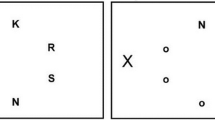Summary
A problem-solving account of act memory predicts stronger impacts of context than theories that explain act memory by reference to automatic processing or by reference to the operation of modality-specific code systems. This prediction was tested in three experiments, all using the loci mnemotechnique to provide contexts for memorization of subject-performed tasks (SPTs). The results of the three experiments did not provide unambiguous evidence for or against any of the rival theories. Most consistent, however, was the observation that memory under motor-encoding conditions profits less on contexts than memory under nonmotor-encoding conditions, a finding which by itself lends more support to a multicode than to a problem-solving interpretation.
Similar content being viewed by others
References
Aaronson, D. (1968). Temporal course of perception in an immediate recall task. Journal of Experimental Psychology, 76, 129–140.
Bäckman, L., Nilsson, L.-G., & Chalom, D. (1986). New evidence on the nature of the encoding of action events. Memory & Cognition, 14, 339–346.
Barsalou, L. W. (1988). The content and organization of autobiographical memories. In U. Neisser & E. Winograd (Eds.), Remembering reconsidered: Ecological and traditional approaches to the study of memory. Cambridge: Cambridge University Press.
Cohen, R. L. (1981). On the generality of some memory laws. Scandinavian Journal of Psychology, 22, 267–281.
Cohen, R. L. (1983). The effect of encoding variables on the free recall of words and action events. Memory & Cognition, 11, 575–582.
Cohen, R. L. (1984). Individual differences in event memory: a case for nonstrategic factors. Memory & Cognition, 12, 633–641.
Cohen, R. L. (1985). On the generality of the laws of memory. In L.-G. Nilsson & T. Archer (Eds.), Perspectives on learning and memory. Hillsdale, NJ: Erlbaum.
Cornoldi, C., & De Beni, R. (1986). Retrieval times in the usage of concrete and abstract mnemonic cues associated to loci. In D. G. Russell, D. F. Marks, & J. T. E. Richardson (Eds), Imagery 2. Dunedin: Human Performance Associates.
De Beni, R., & Cornoldi, C. (1985). Effects of the mnemotechnique of loci in the memorization of concrete words. Acta Psychologica, 60, 11–24.
Engelkamp, J., & Zimmer, H. D. (1984). Motor programme information as a separable memory unit. Psychological Research, 46, 283–299.
Engelkamp, J., & Zimmer, H. D. (1985). Motor programs and their relation to semantic memory. German Journal of Psychology, 9, 239–254.
Engelkamp, J. (1988). Modality-specific encoding and word class in verbal learning. In M. Gruneberg, P. Morris, & R. N. Sykes (Eds.), Practical aspects of memory. Chichester: Wiley.
Hasher, L., & Zacks, R. T. (1979). Automatic and effortful processes in memory. Journal of Experimental Psychology: General, 108, 356–388.
Helstrup, T. (1978). Presence and absence of serial position effects. Scandinavian Journal of Psychology, 19, 301–307.
Helstrup, T. (1984). Serial position phenomena: training and retrieval effects. Scandinavian Journal of Psychology, 25, 227–250.
Helstrup, T. (1986). Separate memory laws for recall of performed acts? Scandinavian Journal of Psychology, 27, 1–29.
Helstrup, T. (1987). One, two, or three memories? A problem-solving approach to memory for performed acts. Acta Psychologica, 66, 37–68.
Higbee, K. L. (1988) Your memory, how it works and how to improve it (2nd ed.). Englewood, NJ: Prentice-Hall.
LaBerge, D. (1976). Perceptual learning and attention. In W. K. Estes (Ed.), Handbook of learning and cognitive processes, vol. 4. Hillsdale, NJ: Erlbaum.
McDaniel, M. A., & Pressley, M. (Eds) (1987). Imagery and related mnemonic processes. Berlin: Springer.
Underwood, B. J., & Schulz, R. W. (1960). Meaningfulness and verbal learning. New York: Lippincott.
Wippich, W. (1980). Bildhaftigkeit und Organisation. Darmstadt: Steinkopff.
Zimmer, H. D. (1984). Enkodierung, Rekodierung, Retrieval und die Aktivation motorischer Programme. Arbeiten der Fachrichtung Psychologie No. 91. Saarbrücken: University of the Saarland.
Zimmer, H. D. (1987). Argumente für ein motorisches Gedächtnissystem. In J. Engelkamp, K. Lorenz, & B. Sandig (Eds.), Wissensrepräsentation und Wissensaustausch. St. Ingbert: Röhrig.
Zimmer, H. D., & Engelkamp, J. (1984). Planungs- und Ausführungsanteile motorischer Gedächtniskomponenten und ihre Wirkung auf das Behalten ihrer verbalen Bezeichnungen. Zeitschrift für Psychologie, 192, 397–402.
Author information
Authors and Affiliations
Rights and permissions
About this article
Cite this article
Helstrup, T. Loci for act recall: Contextual influence on the processing of action events. Psychol. Res 51, 168–175 (1989). https://doi.org/10.1007/BF00309144
Issue Date:
DOI: https://doi.org/10.1007/BF00309144




